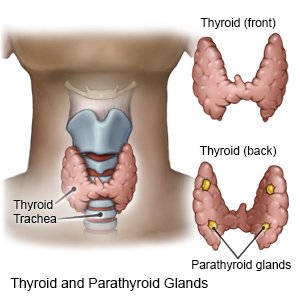Thyroid Ablation
Medically reviewed by Drugs.com. Last updated on Aug 4, 2025.
What is thyroid ablation?
Thyroid ablation is a procedure to decrease the function of some or all of your thyroid gland. Your thyroid makes hormones that help control your body temperature, heart rate, and growth. The hormones also control how fast your body uses food for energy.
 |
How do I prepare for thyroid ablation?
- Your healthcare provider will talk to you about how to prepare for your procedure. Arrange to have someone drive you home after the procedure.
- You may need to decrease or stop eating foods that contain iodine. Ask for a list of foods that contain iodine. Your provider may tell you not to eat or drink anything after midnight on the day of your procedure.
- Tell your provider about all medicines you currently take. He or she will tell you if you need to stop any medicine for the procedure, and when to stop. He or she will tell you which medicines to take or not take on the day of your procedure. This includes medicine that contains iodine or to treat a thyroid condition.
- Blood and urine tests may be done to check your thyroid function. If you are a woman, the tests may be used to check for pregnancy. Tell your provider if you are currently breastfeeding. He or she will give you instructions on when to stop breastfeeding for the procedure. Tell your provider if you plan to become pregnant or breastfeed in the months after your procedure. He or she will give you directions for when pregnancy or breastfeeding will be safe.
- A thyroid scan may be done to check your thyroid function. Radioactive dye is put into your IV or is given to you to drink. The working part of the thyroid gland absorbs the dye. Two to 48 hours later, pictures are taken to show the areas of your thyroid that absorbed the dye.
Related medications
How is thyroid ablation done?
You will be given radioactive iodine to drink or as a pill to swallow. This medicine damages cells in your thyroid gland and decreases the amount of thyroid hormone in your blood. If you cannot swallow the medicine, it will be put through an IV tube into a vein in your arm.
What should I expect thyroid ablation?
- Medicines may be given to keep your thyroid hormone level normal. You may also need medicines to prevent or treat nausea. Medicines may help you have a bowel movement. Bowel movements will help decrease the amount of radiation in your body. You need to have at least 1 bowel movement daily for several days after your procedure.
- Drink more liquids to flush the radiation out of your body and prevent dehydration.
- Radiation safety directions will be given so you do not expose others to radiation.
What are the risks of thyroid ablation?
Your thyroid may no longer work, and you may need thyroid medicine for the rest of your life. You may have swelling in your face and neck. You may have eye dryness, headache, nausea and vomiting, trouble swallowing, taste changes, and dental cavities. A condition called thyroid storm may occur if too much thyroid hormone is released into your body. A thyroid storm may cause high fever, fast heartbeat, high blood pressure, and may be life-threatening.
Care Agreement
You have the right to help plan your care. Learn about your health condition and how it may be treated. Discuss treatment options with your healthcare providers to decide what care you want to receive. You always have the right to refuse treatment. The above information is an educational aid only. It is not intended as medical advice for individual conditions or treatments. Talk to your doctor, nurse or pharmacist before following any medical regimen to see if it is safe and effective for you.© Copyright Merative 2025 Information is for End User's use only and may not be sold, redistributed or otherwise used for commercial purposes.
Further information
Always consult your healthcare provider to ensure the information displayed on this page applies to your personal circumstances.
